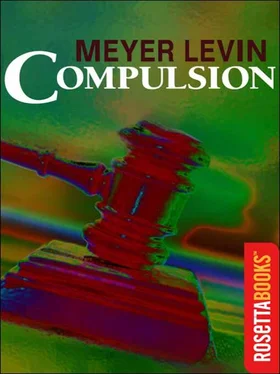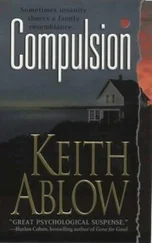So Artie now recalled that there had been a couple of broads involved – he could even think of their names: his was Edna, kind of redheaded. They had picked up the girls on 63rd Street… And so, point by point, he told the same story.
Why had he waited so long to tell it? “My mother doesn’t like me to run with these cheap broads,” he said.
Yet, even his waiting could be interpreted favourably, For if it were simply an alibi that the boys had agreed upon, wouldn’t Artie have come out with it at once, the way Judd had?
And so, that morning, the suspicion was lifting. Judd Steiner, cheerful and candid. And Artie Straus finally corroborating the story of Mae and Edna.
Probably, because of their wealth, I thought, I had been resentfully ready to believe anything of them.
As I entered the newsroom, Reese tilted his chin, a signal for me to step to his desk. “I think they’re clean,” I said. “Artie Straus just told exactly the same story as Judd Steiner, about the two girls.”
He shoved the early edition of the American toward me, with part of their lead story circled in red pencil. It was a beat on us. A letter, a carbon found in Judd Steiner’s room. “Dear Artie,” it began. It seemed to deal with some bygone incident between Judd and Artie and Willie Weiss, and at first glance I could not see its importance. There was some quarrel about whether Judd had betrayed to Willie Weiss a secret that Artie had confided to Judd. This letter was Judd’s denial of betrayal. It had been written after a big scene between them. A passage, printed in bold type read: “When you came to my house this afternoon I expected either to break friendship with you or attempt to kill you unless you told me why you acted yesterday as you did.” This was Judd, to Artie.
The letter continued: “You did, however, tell me… Now, I apprehend, though here I am not quite sure, that you said that you did not think me treacherous in intent, nor ever have, but that you considered me in the wrong and expected such a statement from me. This statement I unconditionally refused to make until such time as I may become convinced of its truth…”
It was a strange letter, but what did it have to do with the case? I glanced back at the date – months ago, last November. I went on reading: “The only question, then, is with you. You demand me to perform an act, namely, state that I acted wrongly. This I refuse. Now it is up to you to inflict the penalty for this refusal – at your discretion, to break friendship, inflict physical punishment, or anything else you like, or on the other hand continue as before. The decision, therefore, must rest with you. This is all of my opinion on the right and wrong of the matter.”
I looked up, puzzled. Reese was watching me. I shook my head to show my mystification, and resumed reading: “Now a word of advice. I do not wish to influence your decision either way, but I do want to warn you that in case you deem it advisable to discontinue our friendship, that in both our interests extreme care must be had. The motif of ‘a falling out of -’ would be sure to be popular, which is patently undesirable and forms an irksome but unavoidable bond between us…”
Feeling Reese’s eyes still on me, I had drifted down the aisle, and was standing near Tom. At the moment it didn’t even strike me as important that the paper indicated some words omitted after “falling out”. Perhaps they had been undecipherable. There was more to the letter. Judd begged Artie for his decision, yes or no, and he suggested that in any case they keep up an appearance of friendship such as “salutation on the street” and on all occasions when they might be thrown together in public.
But what did it mean? Aside from showing the intensity and violence of their relationship, what bearing could it have on the murder of Paulie-Kessler?
Tom was typing rapidly, to catch us up on the story. He had a scrawled copy of the letter on his desk. That bastard Mike Prager had gone out with the squad last night when the cops had ransacked Judd Steiner’s room. Mike had pocketed this letter. Only just now, after his paper was on the stands, had Mike turned the letter over to Chief Nolan.
Tom handed me up his notes, containing the left-out words. “The motif of ‘a falling out of a pair of c -’ would be sure to be popular…”
I saw again the naked body of the boy, I heard again the gruesome argument at the inquest, I saw the candid smile of Judd Steiner, whom I had just left, I saw the boyish smile of Artie Straus, whom I had just left, and I felt a sick bewilderment, an inadequacy. I was too innocent; I was unable to recognize the ugly and the bestial that lay underneath the smiling world.
They had seemed so bland. I had made a fool of myself just now, telling Reese, “They’re clean.” These diseased creatures, these perverts, they had been going out with me and with my girl. Judd had done something to Ruth, disturbed her deeply in some way. Perhaps something of this was what she had known. Through Judd’s ways, she knew they had done it. They had done it to Paulie Kessler.
Then I held myself back. I tried to tell myself the word could have been used in jest, the way we commonly used it around the frat house. I tried to tell myself, even if they were perverts with each other, that still didn’t prove they had done anything to Paulie. I tried to tell myself not to let my anger run away with me.
“What do you think of your pals now?” Tom said.
“God, this looks like they really might have done it.”
“You can’t prove it from this,” he said.
“And Horn looked about ready to let them go.” I told him of Judd, so easy in his interview; I told how Artie had finally confirmed Judd’s alibi about picking up a couple of girls.
“Picking up a boy, he means,” Tom said. While he typed, he handed me a few more pages, copied from Judd’s letters.
First there was a document that had been attached to what was to become known as the “c – letter”. It was a legal-sounding document, and its purpose was explained in the letter itself: “I wanted you this afternoon, and still want you, to feel that we are on an equal footing legally, and therefore, I purposely committed the same tort of which you were guilty, the only difference being that in your case the facts would be harder to prove than in mine, should I deny them. The enclosed document should secure you against my changing my mind in admitting the facts, if the matter should ever come up, as it would prove to any court that they were true.”
Then came the document: “I, Judah Steiner, Jr., being under no duress or compulsion, do hereby affirm and declare that on this, the 20th day of November, 1923, I for reasons of my own locked the door of the room in which I was with one Arthur Straus, with the intent of blocking his only feasible mode of egress, and that I further indicated my intention of applying physical force upon the person of said Arthur Straus if necessary to carry out my design, to wit, to block his only feasible mode of egress.”
I stared at Tom. As he sent up his story, we tried to reconstruct what had gone on between the two boys. Judd was handing Artie “evidence” that he had locked Artie in a room, saying, meanwhile, “I purposely committed the same tort of which you were guilty.” So, apparently, in a bitter wrangle they had been locking each other up! First Artie locking up Judd, because he claimed Judd had betrayed a confidence, had been “treacherous”. And then Judd locking up Artie.
It had a weird overwrought echo of childhood games, locking someone in a closet – “I won’t let you out until you tell me the secret.” But these were university graduates, prodigies of eighteen. Where on earth did Judd imagine, before what “court”, would Artie presumably ever produce Judd’s legal-sounding admission of a “tort”?
Читать дальше












